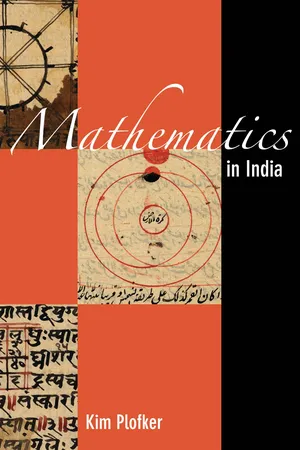
- 360 pages
- English
- ePUB (mobile friendly)
- Available on iOS & Android
Mathematics in India
About this book
Based on extensive research in Sanskrit sources, Mathematics in India chronicles the development of mathematical techniques and texts in South Asia from antiquity to the early modern period. Kim Plofker reexamines the few facts about Indian mathematics that have become common knowledge--such as the Indian origin of Arabic numerals--and she sets them in a larger textual and cultural framework. The book details aspects of the subject that have been largely passed over in the past, including the relationships between Indian mathematics and astronomy, and their cross-fertilizations with Islamic scientific traditions. Plofker shows that Indian mathematics appears not as a disconnected set of discoveries, but as a lively, diverse, yet strongly unified discipline, intimately linked to other Indian forms of learning.
Far more than in other areas of the history of mathematics, the literature on Indian mathematics reveals huge discrepancies between what researchers generally agree on and what general readers pick up from popular ideas. This book explains with candor the chief controversies causing these discrepancies--both the flaws in many popular claims, and the uncertainties underlying many scholarly conclusions. Supplementing the main narrative are biographical resources for dozens of Indian mathematicians; a guide to key features of Sanskrit for the non-Indologist; and illustrations of manuscripts, inscriptions, and artifacts. Mathematics in India provides a rich and complex understanding of the Indian mathematical tradition.
**Author's note: The concept of "computational positivism" in Indian mathematical science, mentioned on p. 120, is due to Prof. Roddam Narasimha and is explored in more detail in some of his works, including "The Indian half of Needham's question: some thoughts on axioms, models, algorithms, and computational positivism" (Interdisciplinary Science Reviews 28, 2003, 1-13).
Tools to learn more effectively

Saving Books

Keyword Search

Annotating Text

Listen to it instead
Information
Table of contents
- Cover
- Title Page
- Copyright
- Contents
- Preface
- List of Abbreviations
- Chapter One - Introduction
- Chapter Two - Mathematical Thought in Vedic India
- Chapter Three - Mathematical Traces in the Early Classical Period
- Chapter Four - The Mathematical Universe Astronomy and Computation in the First Millennium
- Chapter Five - The Genre of Medieval Mathematics
- Chapter Six - The Development of “Canonical” Mathematics
- Chapter Seven: The School of Mādhava in Kerala
- Chapter Eight - Exchanges with the Islamic World
- Chapter Nine - Continuity and Changes in the Modern Period
- Appendix A - Some Basic Features of Sanskrit Language and Literature
- Appendix B - Biographical Data on Indian Mathematicians
- Bibliography
- Index
Frequently asked questions
- Essential is ideal for learners and professionals who enjoy exploring a wide range of subjects. Access the Essential Library with 800,000+ trusted titles and best-sellers across business, personal growth, and the humanities. Includes unlimited reading time and Standard Read Aloud voice.
- Complete: Perfect for advanced learners and researchers needing full, unrestricted access. Unlock 1.4M+ books across hundreds of subjects, including academic and specialized titles. The Complete Plan also includes advanced features like Premium Read Aloud and Research Assistant.
Please note we cannot support devices running on iOS 13 and Android 7 or earlier. Learn more about using the app